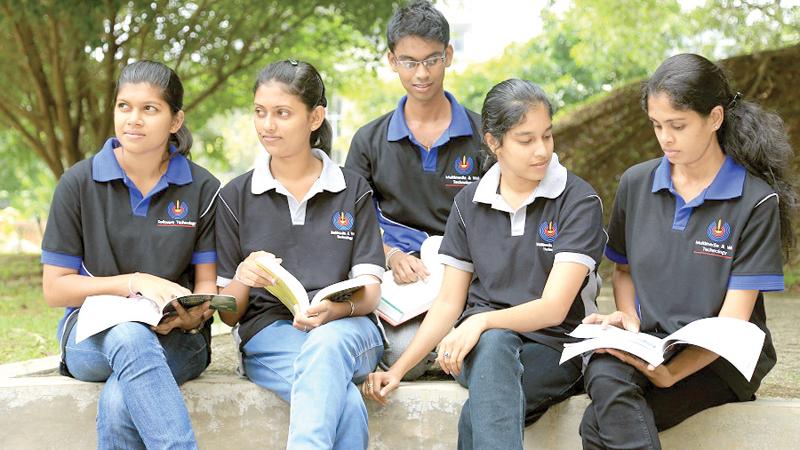
Being the only public university that caters to NVQ and GCE A/L students, the University of Vocational Technology (UoVT) is introducing several entry routes widening its pool of undergraduates.
Along with the new intake 2022, these new routes have been now publicly announced for all those who are interested to pursue a student career in a technology university to apply for a placement.
Since 2008, the UoVT has been conducting several technology related degree programs, the design of which has been primarily based on the Subject Benchmark Statements.
Developed by the Quality Assurance and Accreditation Council of the University Grants Commission (UGC) these Subject Benchmarks recommend five major components such as Foundation Studies, Professional studies, Academic studies (subject specific), Electives and Practicum and Field Experience.
Bachelor degrees
This yardstick is important as it describes the academic and professional knowledge landscape, capabilities and attributes of the awardees of the Bachelor degrees.
It helps the prospective employers and the society at large to gauge the range of their intellectual abilities, readiness and outlook in general.
While keeping in mind that the demand is high, entry is competitive and only a fraction can be physically absorbed, apparently because of resource constraints, a more liberal and open entry criteria has been newly introduced along with the intake 2022 which is belated by almost a year due to Covid-19.
All the degree programs have already been elevated to four year Hons degrees so that anyone pursuing any one of the main technology streams such as Film for example in detail, it is advisable to go for a B.Tech (Hons) course. For a more balanced and multi-disciplinary approach, it is better to pursue a B. Tech (General) course for undergraduate studies.
The Bachelor of Hotel Management is one such degree program which is now elevated to a four year Hons while widening up the subject scope, without limiting it to hotel only.
Studying Hospitality and Tourism Management opens the door to a variety of sought-after careers in hotel and resort management, travel consultancy, tourist attractions, leisure and event industry and many other related fields.
The hospitality and tourism industry is increasingly focusing on international visitors and is looking for ways to partner with the tourism industry. Managers with knowledge of both sectors, and an ability to tailor hospitality services for overseas visitors, are in great demand in Sri Lanka and overseas.
The entry criterion encompasses NVQ level 5 or 6 in the discipline of event management, hospitality management or travel and tour management, or NVQ equivalent qualification in any of the above disciplines as certified by the Tertiary and Vocational Education Commission in Sri Lanka (TVEC) or the Committee of Equating or Validating Certificates and Diplomas of the National Apprentice and Industrial Training Authority (NAITA) or Non NVQ qualification in the above disciplines with five years’ experience as decided by the Academic Council of the University of Vocational Technology or GCE A/L candidates in any stream on the priority of z-score rating (subject to successful completion of gap filling program before commencement of the semester 1).
The Bachelor of Technology in Film and Television Production Technology is also a four-year Hons degree with an exit at the end of the third year with a Bachelor General degree. With its strong emphasis on real-world and real-work experience, this entrepreneurial-focused course offers the skills needed to achieve success producing first-class television studio and film work.
The degree offers a business-based approach to TV and film production, providing the knowledge and expertise needed to establish a successful career in this dynamic industry. Entry criterion includes NVQ level 5 or 6 in the discipline of Film, Television Production, Post-Production, Multimedia, Visual Communication, Photography, Image Art, Media, Journalism (including subject areas of Film, Television, Audio Visual Production), Electronics, Telecommunication, or NVQ equivalent diploma qualification in any of the above disciplines with the course duration of more than one year or above, as certified by the Tertiary and Vocational Education Commission in Sri Lanka (TVEC) or the Committee of Equating or Validating Certificates and Diplomas of the National Apprentice and Industrial Training Authority (NAITA), or Non-NVQ qualification in any of above disciplines with the course duration of more than one year or above issued by a recognised government institute with two year of experience as decided by the Academic Council of the University of Vocational Technology, or GCE A/L candidates passed in any of the streams including the subject Communication and Media Studies.
All GCE A/L candidates will be subjected to successful completion of six months of a weekday gap filling program including an industrial exposure parallel to the semester 1 of the degree). All the applicants shall sit the aptitude test held by the University of Vocational Technology.
New modality
For Bachelor of Education in Technology, a new module structure has been introduced to strengthen the existing delivery by revamping seven key components namely, technology modules, education specific modules, management modules, aesthetic modules (electives), final year project, dissertation and internship, in a different mix.
This new modality has been introduced in three clearly delineated streams namely, Engineering Technology, Bio Technology and Information Technology.
It is hoped this form of delivery will endure the National Vocational Qualification based technology studies at Level 4 and 5 where the students are first of all selected to any one of the appropriate streams, according to their GCE Advanced Level studies or the field of study during NVQ 5. Thus, the program has a flexible structure where the students are selected for any one of the disciplines as appropriate to their pre-university studies.
The writer is Actg Dean, Faculty of Industrial Technology, University of Vocational Technology
